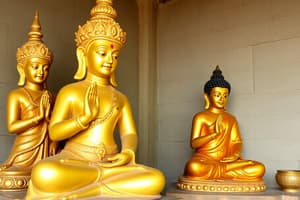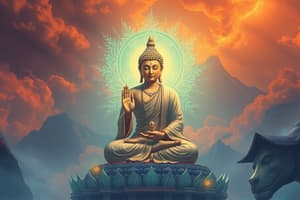Podcast
Questions and Answers
Apa tujuan dari perjalanan ke Haridwar dalam agama Hindu?
Apa tujuan dari perjalanan ke Haridwar dalam agama Hindu?
- Melakukan upacara pemujaan
- Memperoleh petunjuk spiritual
- Membersihkan dosa (correct)
- Mencapai nirvana
Siapakah dewa yang disembah di Kuil Puri Jagannath?
Siapakah dewa yang disembah di Kuil Puri Jagannath?
- Lord Shiva
- Lord Vishnu
- Lord Jagannath (correct)
- Lord Krishna
Apa yang menjadi fokus utama dalam Buddhisme untuk mencapai nirvana?
Apa yang menjadi fokus utama dalam Buddhisme untuk mencapai nirvana?
- Memperoleh harta benda
- Penghormatan kepada Buddha
- Mengatasi penderitaan (correct)
- Pemujaan dewa-dewi
Apa yang dipercayai umat Hindu tentang reinkarnasi?
Apa yang dipercayai umat Hindu tentang reinkarnasi?
Di mana Varanasi terletak?
Di mana Varanasi terletak?
Siapakah dewa yang diasosiasikan dengan hujan dalam agama Hindu?
Siapakah dewa yang diasosiasikan dengan hujan dalam agama Hindu?
Siapakah dewa paling penting dalam agama Hindu?
Siapakah dewa paling penting dalam agama Hindu?
Apa ajaran penting dalam Hinduisme untuk mencapai moksha?
Apa ajaran penting dalam Hinduisme untuk mencapai moksha?
Apa makna Diwali dalam agama Hindu?
Apa makna Diwali dalam agama Hindu?
Dimana tempat suci yang sering dikunjungi oleh umat Hindu disebut sebagai?
Dimana tempat suci yang sering dikunjungi oleh umat Hindu disebut sebagai?
Apa konsep yang mendasari keyakinan reinkarnasi dalam agama Hindu?
Apa konsep yang mendasari keyakinan reinkarnasi dalam agama Hindu?
Apa perbedaan inti antara Hinduisme dan Buddhaisme?
Apa perbedaan inti antara Hinduisme dan Buddhaisme?
Flashcards are hidden until you start studying
Study Notes
Hinduism and Buddhism Culture
Hinduism and Buddhism are two of the oldest surviving religions in the world, both originating in India. While they share some similarities, such as a focus on meditation and enlightenment, their core beliefs and practices differ significantly, with Hinduism being polytheistic while Buddhism is non-theistic. In this article, we will explore the key aspects of each religion's culture: Hinduism's beliefs, Hindu pilgrimage sites, Buddhist practices, and Hindu festivals.
Hinduism Beliefs
Hinduism has a complex belief system, involving different gods, goddesses, and deified human beings known as Devas. The most important deity in Hinduism is Vishnu, who is considered to have created the universe and maintains it through his various incarnations. Other significant deities include Shiva, Brahma, Surya (Sun), Chandra (Moon), Indra (Rain), Agni (Fire), Varuna (Ocean), and Yama (Death). Hindus believe in reincarnation, where one's soul travels from body to body until it attains moksha (liberation) or salvation. This idea of reincarnation stems from the belief in karma, which dictates that all actions carried out by a person whether good or bad, will affect their future lives.
Hindu Pilgrimage Sites
Hindus often visit places called tirthas or teerthas, which are sacred locations connected to their religious traditions. These places act as pilgrim centers where they can pay homage to their gods and perform rituals. Some famous Hindu pilgrimage sites include:
-
Vrindavan: A town near New Delhi associated with Lord Krishna's childhood and youth. It is known for its temples dedicated to Radha and Krishna.
-
Puri Jagannath Temple: Located in Puri, Odisha, this temple is dedicated to Lord Jagannath, a form of Vishnu. It is believed to fulfill wishes when visited during special occasions like Rathyatra.
-
Haridwar: A holy city located in Uttarakhand at the foothills of the Himalayas. Here, the Ganges enters the plains after flowing down from the mountains. It's believed that bathing here cleanses sins.
-
Varanasi: Known as the spiritual capital of India, Varanasi was established around 3000 years ago. It is home to numerous temples built along the banks of River Ganga. According to Hindu mythology, dying in Varanasi brings salvation.
These pilgrimage sites serve as religious centers where people can engage in religious activities and gain merit by visiting them. They also act as places of refuge for those seeking solace from life's troubles.
Buddhist Practices
Buddhism does not worship any personal Gods but rather focuses on achieving nirvana, a state of liberation from suffering. Its founder, Siddhartha Gautama (also known as Gautama Buddha), taught that desire, attachment, ignorance, and intolerance were the root causes of suffering. Therefore, the path to enlightenment involves eliminating these afflictions. Key teachings in Buddhism include:
-
The four noble truths: These describe the reality of suffering, its cause, cessation, and the path leading to its end.
-
The eightfold path: Consisting of right understanding, right intention, right speech, right action, right livelihood, right effort, right mindfulness, and right concentration, this path leads to nirvana.
-
Monastic lifestyle: Many followers of Buddhism choose monkhood, living simple lives focused solely on their spiritual practice.
Unlike Hinduism, where priests mediate between devotees and divinities, Buddhists don't need intermediaries. Instead, they rely on self-discipline, wisdom, and compassion to achieve spiritual insight.
Hindu Festivals
Hinduism celebrates several festivals throughout the year, most of which revolve around the lunisolar Hindu calendar. Some notable Hindu festivals include:
-
Diwali (Deepavali): Marked by the lighting of lamps, Diwali signifies the victory of light over darkness, good over evil, and knowledge over ignorance. It usually falls in October or November.
-
Dussehra: Also known as Vijayadashami, Dussehra commemorates the triumph of Ram over Ravana, symbolizing the victory of good over evil. It typically occurs in September or October.
-
Ganesh Chaturthi: Celebrated in honor of Lord Ganesha, son of Shiva and Parvati, this festival marks his birth anniversary. It takes place in August or September.
-
Krishna Janmashtami: Commemorating the birthday of Lord Krishna, this festival highlights the divine love story between him and Radha, and the ideals of harmony and equality.
Each of these festivals holds unique significance within the Hindu community, contributing to their cultural heritage.
In conclusion, Hinduism and Buddhism are distinct cultures rooted in India, each offering a unique perspective on spirituality and the meaning of life. Their respective beliefs, practices, and ceremonies reflect their separate histories and principles, yet they share common ground in their pursuit of peace and spiritual growth.
Studying That Suits You
Use AI to generate personalized quizzes and flashcards to suit your learning preferences.




